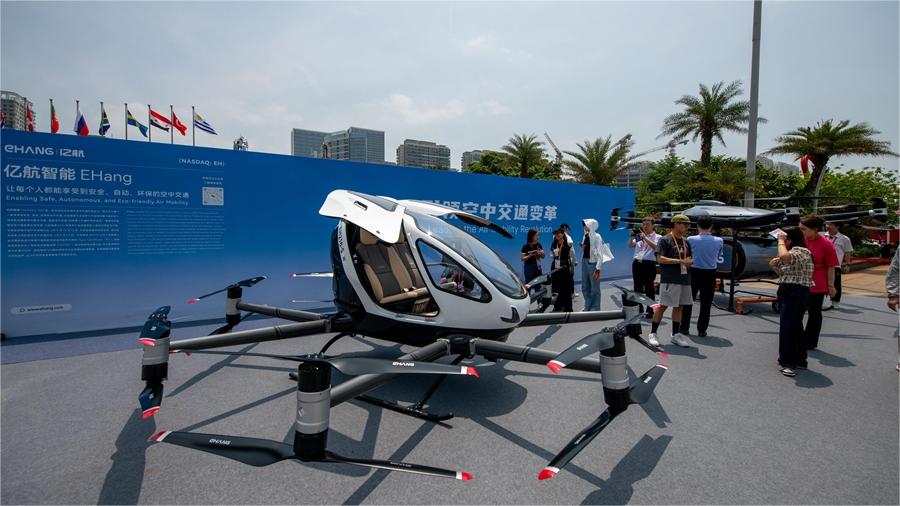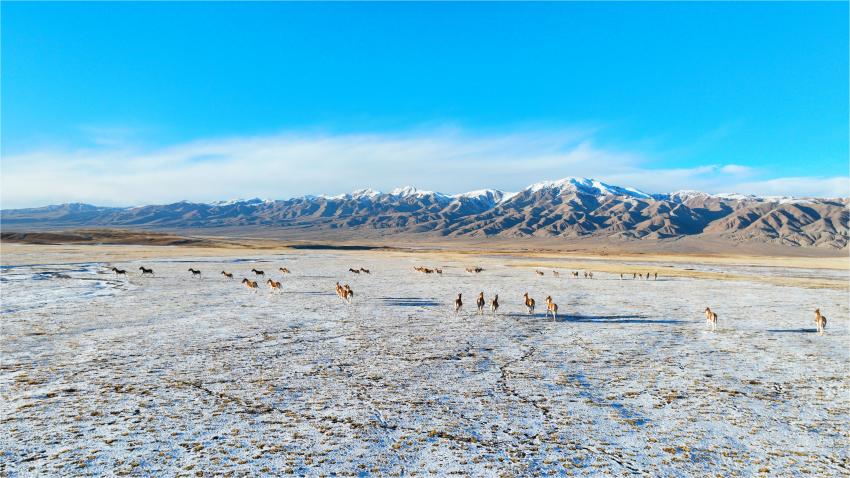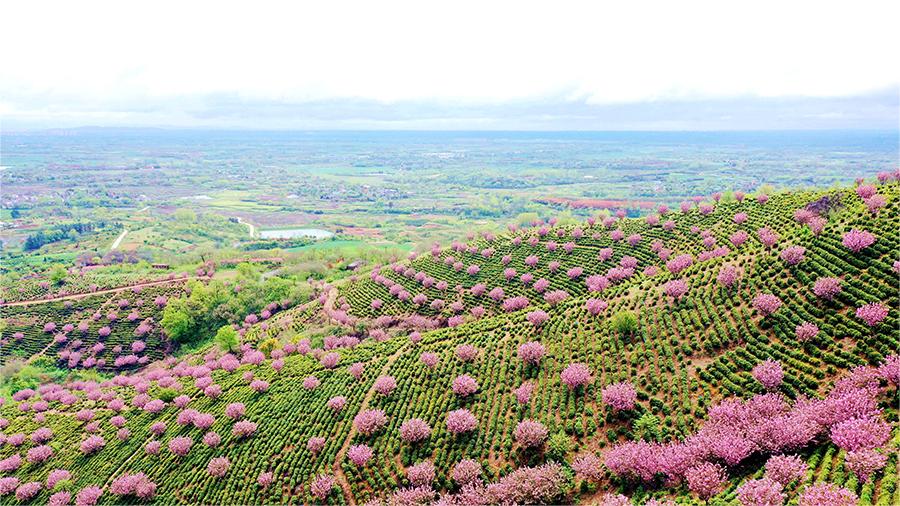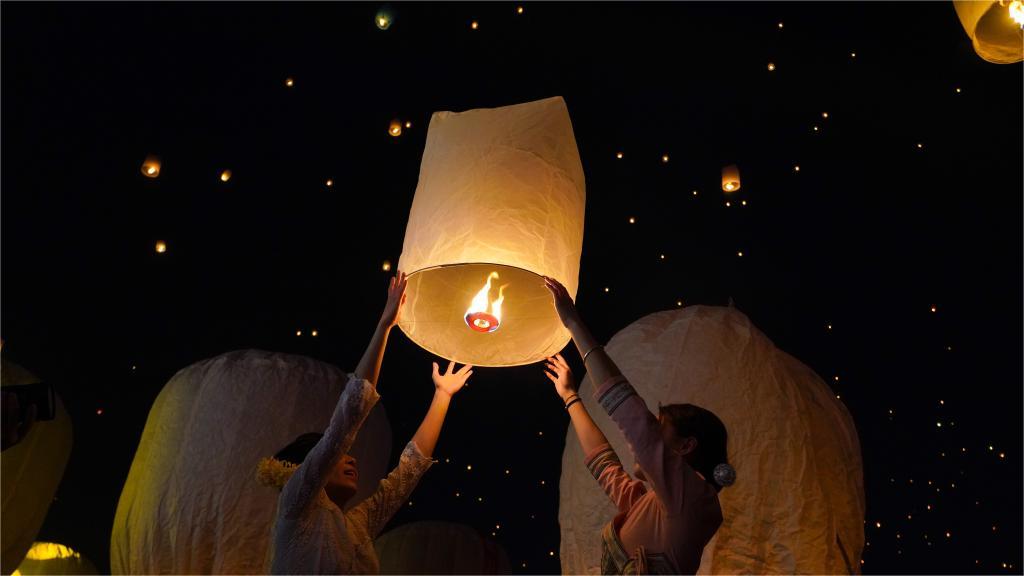Letter from Lhasa: My first visit to Lhasa, where tradition meets modernity
LHASA, April 16 (Xinhua) -- After a bumpy four-and-a-half-hour flight from Beijing, I finally set foot in Lhasa on a sunny afternoon -- an elusive destination previously confined to books and television screens for me.
Stepping off the plane, I was enveloped in the warm embrace of a dear friend, who draped a white hada -- a traditional Tibetan scarf symbolizing purity and auspiciousness -- around my neck.
Then I joined her in her car, heading for the hotel where I would be staying. Everywhere I looked, there were vibrant advertisements vying for my attention: the allure of Tibetan medicine, intricately crafted Tibetan-style wooden furniture, the outdoor opera of Princess Wencheng, new-energy vehicles, smartphones and beers.
I was captivated by the unique blend of tradition and modernity that permeates this city, at an altitude of more than 3,600 meters, in southwest China's Xizang Autonomous Region.
My hotel is conveniently located near Lhasa's iconic landmarks -- the Jokhang Temple and the Potala Palace. It boasts smart-home features throughout and even provides a dispersed oxygen supply system for guests during the night.
The Potala Palace, with its striking red-and-white architecture, stands out boldly against the azure sky. Meanwhile, pilgrims walk in unison along Barkhor Street, moving clockwise around the Jokhang Temple, spinning prayer wheels as they go.
One memorable day in late February, I bore witness to the debate and award ceremony conferring the title of Geshe Lharampa, the highest degree in the exoteric teachings of the Gelug school of Tibetan Buddhism. It is equivalent to a doctoral degree in modern education.
At 8:20 a.m., a procession of monks descended from coaches, their solemn footsteps echoing as they made their way towards the Jokhang Temple. By 9 a.m., the temple was abuzz with anticipation as the sutra debate commenced. For three riveting hours, the air crackled with the energy of eager questioning and thoughtful answers. Eventually, 12 monks obtained the degree.
Among them was 40-year-old Losang Phuntsog. He has studied five Tibetan Buddhism classics for more than 20 years.
"The pursuit of Buddhist teachings has no end, and I will continue refining my understanding of Buddhist philosophy while passing on my knowledge to more monks," he told me.
Lhasa resembles metropolitan cities worldwide, featuring vibrant shopping centers, restaurants, and cozy tea and coffee shops. However, what sets it apart is its unhurried atmosphere, infused with the fragrant scent of Tibetan incense wafting through the air, and the presence of bilingual road signs and storefronts.
What struck me most was Xizang's remarkable appeal to tourists, drawing over 55 million visitors last year. There is no doubt that many are attracted by its distinctive culture.
During my visit to the people's art hall of Xizang, I had the pleasure of meeting four delightful children. In contrast to the typical hobbies favored by children in my hometown of Beijing, such as piano, swimming or computer programming, these youngsters exhibited a keen interest in Tibetan opera, an art form with a history of over 600 years.
Chimed Drolkar, at the tender age of 11, harbors dreams of pursuing a career as a professional Tibetan opera performer. Similarly, 11-year-old Tenzin Palden shared his aspiration of becoming a skilled drummer within this vibrant cultural landscape.
Observing the enthusiasm of these young talents filled me with excitement. It's inspiring to see Tibetan opera offered as an optional course in many schools, as is the rise of over 150 part-time Tibetan opera troupes across the region.
In Lhasa, I found a delightful blend of traditional charm and modern convenience. From hailing taxis to ordering food or booking tickets for attractions, all were done effortlessly through my smartphone. Whether dining in a traditional Tibetan eatery or international chains like Pizza Hut, KFC or Starbucks, cashless payment options abound.
In a nearby shopping mall, robots navigate a Hong Kong-style tea restaurant, delivering meals with precision. Even in my hotel, the surprise of a delivery robot appearing at my door with my fruit order showcased the seamless integration of technology into daily life.
As my journey drew to a close, my friend posed a question: "Will you return?"
"Absolutely," I replied with a smile. "In Lhasa, time slows down, offering a remedy for impatience -- a perfect fit for me."
Photos
Related Stories
- Looking back at days of heroism, humiliation in "heroic county" on roof of world
- China's Xizang exports locally-grown fruit for first time
- View of blooming flowers in China's Xizang
- Conservationists give wings to black-necked cranes on "roof of the world"
- Black-necked cranes spotted at wetland in China's Xizang
Copyright © 2024 People's Daily Online. All Rights Reserved.









